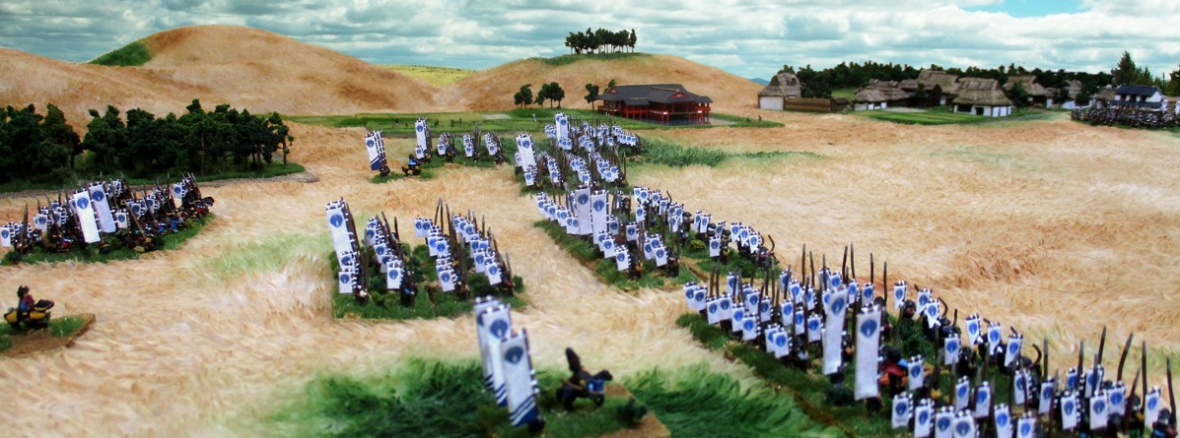Oda Nobunaga has a reputation in the West for tyranny and ruthlessness bordering on the psychopathic, his vassals kept in line by a reign of terror. Such portrayals can reach levels of rather grotesque caricature, as in the recent Netflix ‘documentary’ series.
A recent podcast covering the settling of the struggle between Toyotomi Hideyoshi and Tokugawa Ieyasu in 1584 by diplomatic means posed the hypothetical question of how Oda Nobunaga would have dealt with it. The implication being with inevitable and implacable violence.
So, I thought I’d list a few instances where Nobunaga’s vassals crossed him, and what happened to them.
Shibata Katsuie: Supported Nobunaga’s brother against Nobunaga during the Oda succession. Fought a battle against Nobunaga, but was defeated. Katsuie would go on to become one of Nobunaga’s most trusted vassals and would be given command of the Oda northern campaigns.
Hashiba Hideyoshi: During one of those northern campaigns, Hideyoshi had a row with Shibata Katsuie and stormed off, leaving the army and going back to his castle. Nobunaga was furious and ordered Hideyoshi confined to that castle. Within a year, all was forgiven and Hideyoshi had been given command of the Oda campaign against the Mōri.
Maeda Toshiie: Early on in his career, he got into an argument with a tea master and killed the man in front of Nobunaga. Nobunaga was talked out of sentencing Toshiie to death by some of his other vassals, and instead banished him. Toshiie fought on the Oda side at Okehazama without permission, and then subsequently at Moribe. Nobunaga accepted him back into his service after that and eventually gave him a fief.
Mori Nagayoshi: Reportedly short of stature and short of temper too, Nagayoshi was an accomplished spear fighter, as well as being headstrong and unruly. He repeatedly disobeyed Nobunaga’s orders, and some letters survive from Nobunaga issuing written warnings. Nagayoshi was never actually punished however, and the tone of the letters imply that Nobunaga knew the warnings weren’t going to be any use anyway, and they both knew it.
Takenaka Shigeharu: When Nobunaga suspected Kuroda Yoshitaka of treachery, he ordered Hideyoshi to execute Yoshitaka’s son (the future Kuroda Nagamasa) who he was holding as a hostage. Hideyoshi’s vassal, Takenaka Shigeharu, instead hid the child away in one of his retainer’s castle. Shigeharu then told Nobunaga that the execution had been carried out. Eventually, Yoshitaka proved his loyalty and was reunited with his son. When the deception was revealed to Nobunaga, no-one was punished.
Well, maybe not so tyrannical after all. To return to the podcast question, one wonders how Takeda Shingen would have reacted if one of his vassals had deserted the army, jeopardising a military operation in the way that Hashiba Hideyoshi did.


“When the deception was revealed to Nobunaga, no-one was punished… Well, maybe not so tyrannical after all.”
I think it was just his pragmatic nature. It’s my understanding that Kodera Masamoto saw Kanbei as a threat and plotted with Araki Murashige to cage him in Arioka castle so that he could be killed. Araki wouldn’t kill him because he thought he could persuaded to be his military advisor, so he languished in the dungeon. Araki then rebelled against Oda who then attacked him and had his siege attempts repelled. Oda suspected Kanbei was the brains behind the brilliant defense and in retaliation ordered Hanbei to kill Shojumaru. Hanbei was dying, knew Kuroda Kanbei was a good man and shielded his son as he had nothing to lose. Later when this all came out in the open and Oda realized that Kanbei was just a prisoner, he was secretly relieved Hanbei didn’t execute his orders and relished the opportunity to have Kanbei on his side for the upcoming campaigns against the Mori.
LikeLike
The trailer for Kubi seems to suggest Nobunaga was a bit of a prankster when it came to keeping vassals in order but purely from this it’s not clear whether he’s portrayed as actually sadistic or psychotic. The film – written and directed by Takeshi Kitano, who also plays Toyotomi Hideyoshi – is based on Kitano’s novel of the same name, and presumably adopts a specific point of view on this question, as well as the equally intriguing one as to whether Hideyoshi was a loyal vassal to Nobunaga up to the time of the latter’s death or encouraged Akechi Mitsuhide to kill him.
I don’t know how long we have to wait for the film to be released in the west, and have seen no explanation of the title, which I have seen translated as ‘Neck’.
LikeLike
I don’t know much about the film. I think it takes the ‘Hideyoshi Mastermind Theory’ for Honnō-Ji. ‘Neck’ is a literal translation, but I assume ‘Kubi’ is to be understood as ‘head’ as in the severed head of an enemy taken in battle, i.e. ‘kubitori’ (首取り).
LikeLike
Thank you. That at least makes sense. We’ll have to wait to see whether the head being referred to is the obvious one (Nobunaga’s).
LikeLike